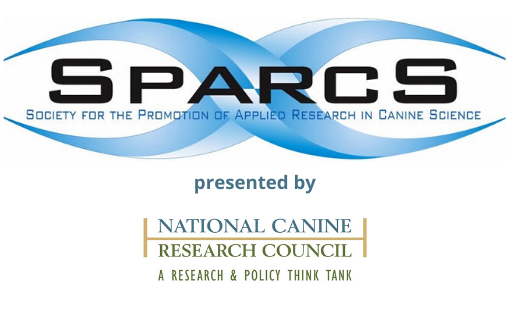A collection of talks from the Society for the Promotion of Applied Research in Canine Science
National Canine Research Council acquired SPARCS in 2015, making its content available to the public. The entire playlist is available on our YouTube Channel and contains all of the talks from the SPARCS 2018, 2015, 2014, and 2013 conferences.
SPARCS is the Society for the Promotion of Applied Research in Canine Science. SPARCS began as a way to bring researchers and dog trainers together in order to provide the most up-to-date, scientifically-based methods to dog training. The goal is to improve the lives of dogs and to support the canine-human bond. For more information, please see our About page.
You do not need a membership! When National Canine Research Council acquired SPARCS, all content was made available online, free of charge.
SPARCS is free! National Canine Research Council sponsors the conference and provides all materials–including the livestream and archived videos–for free to anyone interested.
National Canine Research Council is a non-profit canine behavior science and policy think tank whose mission is to underwrite, conduct and disseminate academically rigorous research that studies dogs in the context of human society. National Canine Research Council advocates innovative and practical canine policy that:
1. Is based on empirically-verified data.
2. Is based on research that embodies the principle that dogs must be considered in relation to humans.
3. Removes barriers to safe and humane pet ownership.
National Canine Research Council’s vision is to progress in our understanding of our relationship with dogs so that limited resources of time and money are spent on studies that consider the full context in which dogs live, rather than on research that fails to consider dogs in their human controlled environment. They aspire to develop a collective expectation that any canine behavior studies may impact public policy and thus the welfare of dogs and their owners. Canine behavior research should therefore be held to a high standard of sound methodology and should always correctly characterize dogs as individuals living in a man-made environment.

We are happy to announce that all of the content that was live streamed for #SPARCS18–as well as the original SPARCS content–was recorded and is available on YouTube (years 2013, 2014, 2015, and 2018). National Canine Research Council is proud to make these resources available free of charge. We hope you enjoy the presentations, interviews, Q&A’s, and panel discussions from previous years, and we look forward to you joining us for #SPARCS in upcoming years
Future SPARCS aims to promote public interest in canine science by providing academically rigorous research for scientists, journalists, policy makers, and the general public to access and further disseminate. You can expect future conferences with topics that investigate canine behavior research in the context of humans. We will also remain committed to raising expectations for canine behavior researchers, their methodologies and sources. As with all of National Canine Research Council’s resources, SPARCS content will remain free and accessible to all who wish to view it.
The Society for the Promotion of Applied Research in Canine Science (SPARCS) is a non-profit organization now maintained by National Canine Research Council. As the previous SPARCS incarnation was winding down in 2015, National Canine Research Council was revving up efforts to embed the study of canine behavior in the context of the human environment. The SPARCS platform offered an opportunity to make the best of this research accessible to everyone. A difference you will notice is that all SPARCS information is now free, as is all of National Canine Research Council’s information, requiring no membership or fees of any kind. We hope you will find it a rich and rigorous source of the best of canine behavior research.